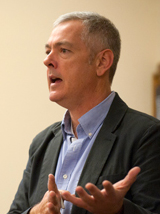

/ Published November 6, 2013
Poetry is language used in full recognition of its layers of significance, in full awareness of its sensual properties as well as its senses. Poetry calls us to take words apart as well as to read them together, to taste them as we talk, to take them in as we breathe them out. Approached this way, many words are little poems. “Gratitude” is certainly one such word.
Say the word slowly. Hold it in your mouth so that you can feel each syllable’s weight on the tongue. The “grat” in “gratitude” is the “grate” in “grateful,” and both branch from the Latin root “gratus,” or “pleasing. This root also produces the flower of “grace.” In the Christian tradition I grew up in, that grace is the gift of divine presence, a gift freely given, one that can be neither earned nor refused. The “tude” here is the same one we find in “attitude,” itself an early Italian adaptation of the Latinate “aptitude.” The syllable takes a stance; it suggests a disposition and derives from a sense of fitness or appropriateness. The fruit produced by these roots and branches is a way of being in the world continually open to its gifts, a way of being in which the world—all that is and happens and is becoming—is a gift.

Michael Thurston
Pretty as this sounds, it is, like most similar truths, a difficult disposition to maintain. Many of the world’s gifts are ones we’d rather not receive: setbacks, challenges, frustrations, losses. Henry David Thoreau, from whom I have picked up this habit of etymological thinking, was as familiar as anyone with these gifts. His beloved brother died, and then a sister. The literary success he hoped for failed to materialize for much of his lifetime. He watched the slavery and sectional division he loathed tear his country apart, as the values he held dear were threatened with defeat. All of these, though, he took as gifts, as the presence of the truths he went to the woods deliberately to find and face. One of the many lessons we learn when trying to follow his paths—around Walden Pond or up the Concord and Merrimack Rivers or along the outer reaches of Cape Cod—is to be grateful for what is.
Michael Thurston is a professor of English and director of the Program in American Studies.















